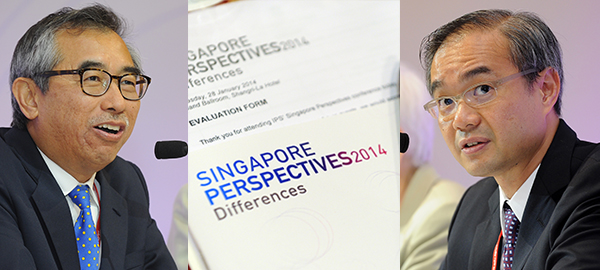
This reflective essay is based on the first panel session titled “From Differences, Unity” from the Singapore Perspectives Conference 2014.
Speakers:
Associate Professor Kwok Kian Woon
Associate Provost (Student Life), President’s Office
Division of Sociology
School of Humanities and Social Sciences
Nanyang Technological University
Dr Leslie Teo
Managing Director
Chief Economist
and
Director of Economics and Investment Strategy
GIC Private Limited
Chairperson:
Dr Sharon Siddique
Director
Sreekumar.Siddique & Co Pte Ltd
and
Visiting Professorial Fellow
Lee Kuan Yew Centre for Innovative Cities
Singapore University of Technology and Design
In his presentation, Assoc. Prof. Kwok made reference to an old The Straits Times article by IPS Director Janadas Devan about the Singapore Pledge. In his article, Mr Devan noted how an early draft of the Pledge was worded as such: “We, as citizens of Singapore, pledge ourselves to forget differences of race, language and religion and become one united people”. Assoc. Prof. Kwok agreed with Mr Devan’s argument that this initial draft of the Pledge was idealistic in calling on all to forget differences. Assoc. Prof. Kwok also concurred with Mr Devan’s assessment that the formulation in the Pledge as we know it — “one united people, regardless of race, language and religion” — is more realistic in its command. It does not deny differences. Rather, it aspires for us to acknowledge our differences, and to be enjoined to go beyond them.
Both Mr Devan and Assoc. Prof. Kwok have proposed valid and insightful arguments. In a world where resources are scarce, it is often difficult to satisfy similar desires or dreams; it would be easier for desires and wants to be satisfied when they are different. Even at the microeconomic level, it is the differences in consumers’ preferences that enable companies to carve out new markets and grow their businesses.
However, basic production theories emphasise that significant efficiency gains can be reaped from economics of scale when production or the production process is specialised. David Ricardo’s idea of comparative advantage and Adam Smith’s theory of division of labour are two economic concepts that propose potential gains from specialisation. Hence, at least in the short run, the production of a variety of goods would normally not be efficient given the lack of specialisation. In the long run, as the company acquires the right technology and technical know-how, producing different goods would bring access to more markets. This will also strengthen the company’s operation through product diversification. Such an effect is somewhat parallel to how diversity strengthens a society, despite the friction and tension caused by differences at the initial stages.
On the macroeconomic level, differences in income distribution and wealth accumulation are indicators of an economy that is growing unhealthily. Such differences are a serious concern of policymakers, because they add more burden to both monetary and fiscal policies to ensure that growth is inclusive above the usual objectives of economic growth and inflation targeting. Dr Teo highlighted that the Singapore economy has grown significantly in the last three decades. The strategy to be an open economy has complemented the economic growth process but seems to be running into diminishing returns in recent years. On top of that, economic growth has been accompanied with widening income disparities, which could be disastrous to the long-run growth momentum if not adequately addressed.
John F. Kennedy once said, “if we cannot now end our differences, at least we can help make the world safe for diversity”. The complete elimination of differences amongst mankind would be a hugely improbable task. It would also not guarantee the eradication of disagreements or disputes. It would help if there were a parsimonious model that could ensure that people with social and economic differences co-exist harmoniously.
Dr Teo suggested that policymakers could find ways to maintain high levels of social mobility among Singaporeans, as it would alleviate the negative effects of widening income disparity. In particular, there is a need to help people come out of the lower income deciles and there should be targeted policies for this purpose. Assoc. Prof. Kwok highlighted that predominant social differences are inherent in the system and new identities that are being created should transcend the usual Chinese, Malay, Indian and Others (CMIO) type of classification to one that is much more representative. At the same time, there is a need for more cohesive community integration, for people from the various income deciles to interact and provide the required assistance to those who need them.
The existence of differences is not perceived negatively by economic players or members of the society. It is the negative effects caused by the perceived differences that have to be limited and reduced for a vibrant and healthy socio-economic environment to thrive. Economic differences such as disparities in income distribution highlight the need for better social and community bonding so that people at the higher income deciles would extend help to those at the lower income deciles. Social differences such as race, religion and culture, create synergy in the way an economy operates and propels the economy towards higher levels of growth. As Mahatma Gandhi said, “honest differences are often a healthy sign of progress”.
Sarjune Ibrahim S/O Sitheek is a research assistant at the Institute of Policy Studies.
For more information on Singapore Perspectives 2014, please visit our IPS website.
Please also do check out the other articles on Singapore Perspectives 2014, including:
• Singapore Perspectives 2014: Opening Remarks by Janadas Devan
• SP 2014: Transcending Differences through the Arts? by Mohammad Khamsya
• SP 2014: Literature and Empathy: Understanding Differences by Zhou Rongchen
• SP 2014: More than Just Differences by Chang Zhi Yang
• SP2014: Contestation versus Consensus: which is a more constructive force? by Teo Jin Ye
